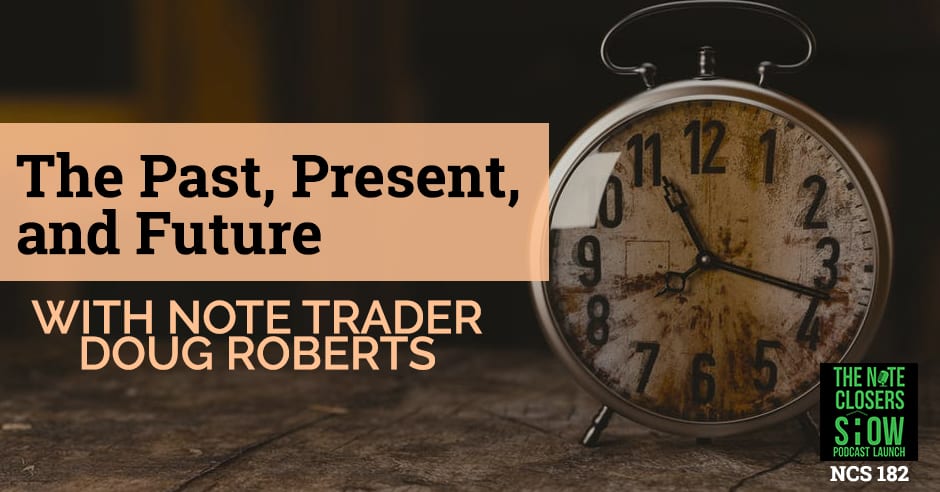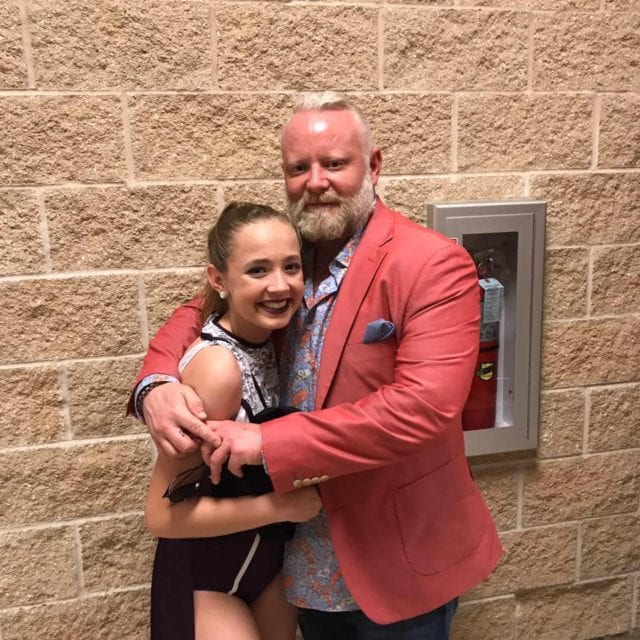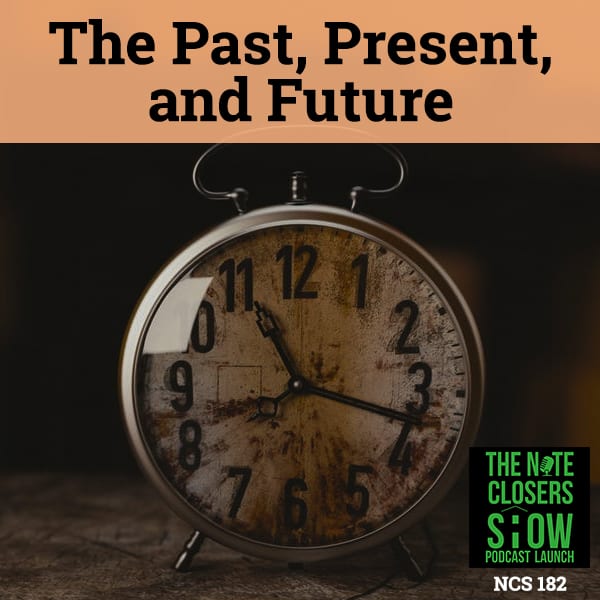
On this episode, Scott interviews long time friend and note trader, Doug Roberts. Doug is the Managing Partner with DSRE Consulting and he is on to discuss the Past, Present and Future condition of the note and real estate markets.
—
Listen to the podcast here
The Past, Present, and Future with Note Trader Doug Roberts
We have a special guest today. I want to differentiate a little bit from the different ways of making money in notes to bring on a guy that I have known going back quite a few years now. A good buddy of mine who I’ve made trades and literally watched each other bounce around and do some amazing things in the industry as we’ve gotten a little bit more mature with what we’re doing. My good buddy, Doug Roberts who’s the managing member of DSRE Funding out of Austin, Texas. Good morning, Doug.
Good morning, Mr. Carson.
Why don’t you tell them a little about who you are and what you do and all that good stuff?

Note Trader: When the bottom fell out, I spent about a year trying to figure what I was going to do.
As it relates to all the notes stuff, I got in the mortgage business back right when the tech bubble blew up. I started a mortgage company, I got a little mortgage bank called Southern Lending and did that right until about 2008 to 2009, grew to pretty substantial. We had about 100 loan officers and probably about 40-ish underwriters and processors on staff. When the bottom fell out, I spent about a year trying to figure what I was going to do. Then figured out that I could go out there and essentially start buying all the bad loans that me and all my peers were writing during the heyday of the mortgage business.
In about early 2010, I started DSRE and initially started doing non-performing stuff and did that for about six months, twelve months. We took down a real big pool, 800 somewhat loans GMAC pool, which back then you could buy for $0.08 or $0.09 on the UPB. It was so many loans that I lost. Just for a year, all I did was work through that tape. Working through that process made some relationships with some guys that had been in the performing note business all the way back since the RTC days. Really buddied up with them and decided that that was going to be a better path for me and so I started doing performing back in early 2011. I liked it better, it made it easier for me to raise money. It was a simpler thing for me, I got it. I understood performance better than non-performance.
Right now, I probably own 250 somewhat performing loans and I probably have a rental pool that’s about half that big. The majority of those rentals though are really lease purchases that we bought in the hopes that they would roll into owner finance. Some of them do and some of them don’t. It’s been an interesting ride these last few years. It seems like performing has now really come to the forefront. It seems like a lot more folks are talking about it. I really enjoy it. It’s a good space that I feel like once you have an understanding of it, it’s easy to understand more and more and more. One of the reasons I enjoy listening to some of your different shows is just reaffirming the intricacies of all these stuff. We’re experts, but if I don’t follow that recipe book, this is baking. It’s not cooking. It’s so easy to forget one little thing about a bankruptcy or I made a mistake on four-loan mods that I bought about a year ago. They were loan mods, so they were bigger loans. They are probably UPBs of $175,000 to $250,000 and I did not do my job properly on them. As a result, I had to buy them back from the capital partner and I’m having to work through them myself. They will work out because I hedged value. Worst case scenario if I have to take them back, then that would be a good pay day, but in the interim, they’re not loans that I can sell because I didn’t do my job.
It’s always good to constantly have these reminders, constantly to put myself in the path of education whether I’m on the teaching side or the learning side. Even though a lot of the times, I just nod my head like, “Yeah, I know this.” There’s not one time that I’m not like, “Yeah, that’s good.” It’s like I listen to one of your things the other day and I’m sending you a text message that night going, “Can you send me that thing that you were talking about?” As I’m sending the text, I’m like, “Doug, you probably could write this.” I’m like, “Dude, this is just how it works.” It’s great to have relationships too. That’s one of the things I love, is there’s so many people that do what we do that are so happy to help each other because we don’t view each other as just this horrible competition. It’s either do it, they’re going to take the deal if they hear about it or whatever. Everyone seems to be pretty forthcoming when sharing with their information, so it’s good stuff.
It’s definitely a very good smaller niche for the most part. There’s enough inventory out here, we’re not having to slice through your throat or stab you in the back to steal leads or business ideas. That’s the unique thing of it. So many people come over to this side of notes and they’re like, “People are nice over here.” I’m like, “Yeah, because we come from a world of abundance.” There’s no way I can take down as many notes as I want to by myself or take down everything. I bought a couple of those assets off the GMAC pools, that’s originally how we met. I bought a couple of condos, a couple of single-family homes from you over the years and a couple of condos in Coral Gables, Florida. You’ve evolved in a variety of ways. You’ve gone from the non-performing side to the performing side. You’ve done some rental pools, some lease options that you convert them in. Where do you see the market going? We labeled this episode: the past, the present and the future aspect of it, where do you see you’re going over the next six to twelve months?
It seems to me when I’m starting to see a lot of the progression is that you’ll have folks that get in to non-performing because the path of entry from a capital standpoint is oftentimes the lowest. You can buy a non-performing for cheaper than you can a performing loan. I start to see a lot of guys that have some success in the training of the non-performing side and then have some success in training at performing. Start to really get excited or interested in being the actual lender, so getting in from day one. The way that I personally did that is I started originating loans on my houses that I was flipping. It allowed me to take a house, even in the area we’re in in Austin where the days on market is really, really easy to do well here. I can buy something that was a little bit further out and maybe not rehab it quite as crazily and still sell it at the top of the market because I would offer owner financing on it. Then with the idea that I was going to carry that loan for X amount of months, and then pull them up and sell them off in million dollar tranches or whatever the case may be. I feel like for myself, where my future is, and then from there, it’s graduated into doing hard money lending.
I feel like that maturation organically sets you up to be a good self-originator of a loan because you really understand all the bits and pieces. If you try to start off originating a loan, all these documents would be so foreign to you. I would call it just a fixed yield, I like hard money loans because I know that I’m going to make 13%, and I know that if anything defaults, I’m not going to lose money when I take it back because I’m not into things more than 65% or 70% of a conservative ARV. That’s where I personally have seen it going.

Note Trader: There’s a lot of ways to make money in a market that otherwise to me felt saturated where I wasn’t seeing a lot of opportunities.
Every time I think that that’s the way Doug thinks the market is going, and then something like Houston happens. Then for me, it’s like this in Florida. It’s like, “Now, there’s going to be tons of non-performing loans. There’s going to be tons of workouts.” There’s a lot of ways to make money in a market that otherwise to me felt saturated where I wasn’t seeing a lot of opportunities. I don’t remember the last time I saw a tape that have about several hundred Houston assets on it. I’m sure those are coming. I don’t know at what level yet. I haven’t seen them yet. I do have some buddies that flip some houses in Houston that they’re slated to do $200,000 or $300,000 in the next twelve months where they thought they might have done $75,000 as a result of the storm. God bless those folks.
I think that’s where it comes. Something else, when Trump got elected, one of the things that I was initially looking for was Dodd-Frank being repealed, which to me would have been very exciting. I know that Dodd-Frank has made me originating owner financed paper more expensive, simply because I choose to use a third party to originate the loans now just to make sure I’ve got that additional layer of security. I’ll be interested to see as legislation changes that that as in any investment vehicle, there’s always going to become some new paths that open up, that maybe right now I don’t see.
Here’s how I look at it and this is when I started to jack with hard money. You start seeing everyone’s flipping houses. To me, it’s like, “There needs to be more money.” Now, what I’m noticing is everyone is a hard money lender except 99% of brokers that are bringing new deals at 14% with four points when it’s probably really a 12.5% loan with two points. You and I both have had to live through countless years of joker brokers or whatever the PC term is these days. I’ve got to love them. I had to fake it until I made it a long, long time ago and I’ll never knock that hustle. With that said, I’m seeing constant, “We do hard money. We do hard money.” You know me, I pretend like I need the money and I’d walk them all the way to the end of the plank and then realize, “Yeah, they’re absolutely not the person. It’s one more person I can mark off my list.”
I always wanted to see one of these groups. I found a group in Dallas that I think I’ve located 380 assignments in the last twelve months that they have done. They’re not going to cover off the ball but I’ve also been able to find that they’re a $100 million fund and they’ve been doing it for a very long time. That’s the future for me but again, for now because it seems like the landscape can change so quick that if I get a pool of non-performing loans in Houston, it looks right and it’s a big play, then I can pump the brakes on everything I’m doing and start to do that. I like that about the note business. I like that that I can see an opportunity. If I’m just flipping houses, all I’m doing is flipping houses. I’m always going to flip a house here and there, when it lands on my desk that I want to do myself, but I like how nimble I can be in the note space where I can change my focus when opportunities present themselves. If I found a tape of 200 non-performing loans in Houston, I’ll be driving right over to the We Close Notes office in North Austin, “Scott, look what I found.”
Then you and I would be driving our happy asses to Houston. Actually, the first tape I ever did was a non-performing tape of Houston note from Aegis Mortgage.
I used to sell paper to them back in the early 2000.
It was 2009. It was a $5 million tape over there. It was after all the shit hit the fan. It’s just the account rep and the presidents who are still left the offices because they basically shut doors. It was a $5 million trade on Houston assets at roughly 50% of value at that point. It was a nice trade.
Did you all end up taking it down?
We flipped it for five points, for $250,000. I got a fifth of that because there are other people involved that were helping and I had a partner at that time. It was not a bad pay day. Not everybody’s first deal is going to put you $50,000 in your pocket. You’ve got plenty of deals at $1,000 here and there.
Especially back then when we first were doing this, it was like, “Where’s the actual pay day?” If I got paid on every asset that I ever looked at, it took me a while to really figure out how to not waste my time. I used to romanticize the idea when I would get a portfolio, “It’s all these assets.” At the end of the day, when somebody would have said, “You don’t even have to bid these. These are yours, now what are you going to do?” I would be like, “I’ve got to start with just asset number one and I’ve got to do all these things on just asset number one.”

Note Trader: I don’t want a huge staff because for me that requires me to consistently feed that staff the opportunities.
I think I learned my lesson on that big GMAC pool that if I’m not going to flip a tape around, if I’m going to really have to do anything with it, I don’t want to buy more than 25 or 30 loans at a time. One, I don’t really have the bandwidth and two, I don’t really want the bandwidth. I don’t want a huge staff because for me that requires me to consistently feed that staff the opportunities. If the opportunities start to dry up, then I have to take my guidelines out a little bit on each side because I’m trying to do deal flow. It’s just like when I have a construction crew on staff for my flips. I’m doing flips just to keep them busy because I don’t want to lose them. I might not even be doing the flip because it really fits my model. That really was my path to getting into the lending side of it rather than the buying side of it. Not that I still don’t buy and sell loans but the lending side of it, I have such control of the deal flow right out of the gate. It takes away some of the variables at least from the buyer-seller.
We had just spoken about that fund that I got a tape from a few weeks ago. I thought it was great. I go to buy it and I raise my capital and everything is good to go, then figured out that the guy that brought it to me actually was full of crap. I had taken my broker blinders off. I’ve been doing this so long, I know what I’m doing and he was speaking the language and I didn’t sniff it out. Lo and behold, I can’t find the seller. I’d have to go back to the capital partner and say, “That million dollars that you were ready to place or give or take, we’re no longer going to do it,” and get some egg on my face, “I didn’t vet the guy right,” and so on and so forth.
That’s the thing that happens in this business. Some people don’t realize that sometimes sellers just disappear at some point or owners don’t do anything for four years on portfolio. Once they start to hold their feet apart a full collateral, the pool servicing notes, they realize they don’t have that stuff.
Then you try to devalue. I had that happen with a group out of Victoria that we just found. I had a guy that I hired on Fiverr just trying to run a little model for me and see if he can locate. He did a pretty good job and he located the guy in Victoria that owed 30 somewhat loans. Approached the guy, everything was great. It would have been a case study for a note workshop, perfect. Then it came time for collateral files. I drove to Victoria to meet with him and explain this to him because I didn’t want him to think I was just trying to fade price. I was like, “Based on what you have in these files, I can’t pay $0.77 for these. I’ve got to be in the $0.60’s because this, this, this.” Of course, he didn’t take it very well.
That’s what can happen when you’re trying to turn a note owner into a note seller that really doesn’t know anything about selling loans and really never had the intention. Until they get a mailer from FMBA or somewhere else like, “Your loan at 123 Main Street, we’re ready to buy it.” They’re like, “How in the world did these folks even know about it?” Because we put together a whole tape for them and really spent a lot of time and put a lot of pressure on my staff on something that in hindsight was never going to close. If it would have they were phenomenal loans. They were owner financed loans. It all had probably four to five years of seasoning and the coupon rate, the weighted average coupon on the portfolio was 12.5. We were going to buy them in the 70’s which was really probably about 65% to 70% of the value of the home, but live and learn.
It’s about a sixteen yield, not bad at all if you got cheap money coming in and you can split that and then make the arbitrage in between for sure. How many deals do you think you’ve done the last eight years, Doug? I know you’re running out of fingers and toes awhile back. Then, the number of individual loans. Let’s take it two categories.
I know I’ve never gone a quarter without closing a new deal, so let’s say I’m doing six a year and then on a good year maybe ten deals. That’s not including the onesie-twosie. I also find some off-loan on FCI that the guy that runs the exchange, Tim Gardner, will call me, “This thing is perfect. No one is touching it.” I’d say in eight years, I probably have done 65 deals, which is a lot including the 800 loan which is a curve record, but with those 60, let’s call that probably 2,500-ish loans, something like that. I thought my future was going to be getting into the real high level of any scratching debt paper and trying to align myself with these big fund managers that we run into. You know the guys I work with out at Arkansas that play around in that space. Again, I just realize, that to me was a very corporate route to go, to try to grow into that, just to be there. The guy that takes the scratch and dent off the guys that are buying scratch and dent, you’re still talking about buying $25 million, $30 million portfolios.
I don’t want to say I didn’t have the bandwidth, I didn’t want to bandwidth to go try to raise that kind of money. Securities, I would have had to go get a seven. I would have had to go get securities. I would have had to go get licenses that I have no desire to go do that kind of stuff but I feel like if you’re going to be jacking with stuff and raising funds in access of $20 million, you better have it really, really buttoned up. Plus, you’re raising institutional money at that point. You’re going to small mom and pop banks and family foundations and people like that that there’s a bump in the road. They’re going to come try to attach and of course, you’re giddied up.
You’ve got four kids?
Nineteen-year old and seventeen-year old boys and then fourteen and thirteen-year old daughters. God bless anyone with two teenage daughters. If you think you’re cool, you’re wrong. If you think you’re right, you’re wrong.
You live life by your own measures, right?

Note Trader: It affords me the opportunity to be able to spend a lot of time doing stuff.
Yeah, to my own payroll, but the stories are great. When the book comes out, it’s going to be a best seller. I promise you, you’ll get a signed copy. It affords me the opportunity to be able to spend a lot of time doing stuff. I can go take my kids to lunch at school every day. My schedule today would have been I was at the gym at 4:30 this morning. I had my call with you in between the gym and this. I had some due diligence I was doing on a loan that I’m getting ready to originate for a guy that’s buying six duplexes up in Dallas. Then I was going to do this. Then I was going to play golf for three or four hours. Then I had time blocked off for more underwriting, a couple of sales calls this afternoon and then picking up my seventeen-year-old after school and he and I are going to go get a bite to eat. I float around and do what I want, which is ideal. It’s really the only thing that works for me.
If somebody is brand new in the business, what would be a tip that you would give them?
I don’t want this to sound like a plug but I wouldn’t tell anyone to do this without being in some type of mentoring program, some type of educational platform like yours. That probably really does sound like a plug and it’s really, really not. I think so many times, you see it in every aspect of real estate especially flipping, “I got this. I’ve watched the TV shows. I took the class.” Actually, one of your students and I had a conversation about this. Taking one class in my opinion is not enough to go out there and start doing deals. I would do lots of paper trades. I would look at tapes, pretend like I got it and work through as much of it as I possibly could without really doing it. I don’t care whose money you’re using. Your money, your parents’ money, your friend’s money, stranger’s money, which that’s where it starts to get a little bit trickier. It’s way easier to lose money than make money. The easiest way to work that is education. Education either cost money and it cost time. I think a lot of times, the path to education is not really that expensive but people just want to get going. They want to start making money.
You need to have mentors. You need to have people who have a vested interest in answering your questions when you have them. If that costs you money, which it should, that’s the only way to mess with it. Like I said, I bought a million dollars’ worth of mods twelve months ago. I did the underwriting myself. I know how to do this. I really understand this stuff and I messed up. I have a million dollars’ worth of mods that the WAC is probably three in an eighth based on the mod docs. I was reading the mod docs on my laptop on an airplane. They were TIF files. I’m literally putting my laptop sideways because I can’t figure out how to tilt or rotate the document. I couldn’t really read the scans of the bankruptcy documents. I’m just, “It’s fine because we’re buying another one from the same group that I’ll never buy from again.”
If I would have slowed down and I would have called someone and be like, “Here’s what I’m doing.” I think education is really, really, really important. It’s paramount. Finding deals is not that hard. Finding money is way easier once you get used to it. A lot of people think that that’s the hardest part. It’s really, really not. There’s always investment money out there. There’s always more money than deals in my opinion. No matter what the economy is doing, there’s always more money than deals. I would tell people to really, really understand what you’re doing. If something doesn’t make sense, make it make sense before you just skirt on buy it. If you’re Googling something to understand the terminology, pump your breaks just a little bit. I’m not saying walk away from the deal. Just pour hours on to it then. Sleep three or four hours a day and spend the rest of your time just completely submersed in the educational portion of it. There’s so much education out there. Guys like yourself Google as a beast. I’ve had a hard time asking her anything that she doesn’t understand.
You and I and quite a few people come from the mortgage industry where we learned mortgage industry happen to be basically loan officers and mortgage brokers. The aspect of coming on the default side is just the reverse side of that. You look through the same stuff, you still look to make sure it’s qualified but now it just had a bigger discount and you’re not originating it. It’s de-originating it for the most part.
We’ve seen the forms before. I had seen a note in the deed of trust and a loan application and a credit report. I learned all that stuff using other people’s money because as a mortgage broker or as a mortgage banker it’s not like we had to raise any capital. It was essentially, “Get this paperwork filled out and hand it to us. Here’s all the money and we’re going to pay you way more than you should for being someone that’s just collecting information from the end user.” Also, you familiarize yourself with all the terminology. It starts to even go down. I had a guy, we’re on a call. I thought he was very experienced. I kept talking about the WAC. Good for him he said, “What is wack?” He could have got off the phone and try to Google and type in wack. He never would have figured out that WAC, weighted average coupon, is just a fancy way of saying, “The weighted average return of this portfolio is.”
I have been the guy that did not ask what the WAC meant because I did not want to look like I didn’t know what was going on. It’s an expensive lesson to learn, either in missing opportunities or even more expensively missing free information. You hear me, I would sit down with anyone and talk for hours and just give them every piece of information that I have because we all like talking about what we know. Who doesn’t? We’re good at what we do. We know a lot about this stuff. We’ve been doing it for a long time comparatively to how long this has really been a market. We’re experts. Barry Bonds should love to talk to you about hitting. That’s just how it is. Everybody loves to talk about what they understand. People newer to the business or people very seasoned in the business should take advantage of that because it’s information. Sometimes it’s free information. Even when it’s not free, it’s not very expensive.
It’s better if with pride a little bit to say, “Can you answer this question? Can you ask a question?” The best bang for my buck is when I go to events, that’s what I’m trying to do, I want to ask a question. If there’s a panelist or a speaker, I’m always thinking, “What’s the question that this person knows that I don’t?” That happens pretty often. You and I pick up the phone, call each other, text each other on a regular basis for the most part, “Have you heard about this guy?” We punch that ad about the San Diego mortgage fraud that you and I both traded with in the past.
It blew my mind. I did big deals with those guys. I bought non-performing jumbos from them.
The fact that those guys are still committing fraud, that just speaks it.

Note Trader: They were really successful back when the mortgage was in its heyday and have great reputations.
That guy does not care. For one, they’re already living in $10 million houses out there, get busted, know they’re going to prison, admit it and then just keep it going. What’s sad about that is they used to be a really legit shop. Those guys have been around for a very, very long time and from the cuts of the market from the very beginning. They were really successful back when the mortgage was in its heyday and have great reputations. Obviously, things change but to go back to what we’re talking about, when you talk about a term like WAC, terms change too. You’ll start to hear, people start to call something different and if I don’t know what they’re talking about, I try really hard not to be the guy that thinks, “I’m the most seasoned vet in this room. I don’t want to ask these people what the hell they’re talking about.” Oftentimes, they’re saying the exact same thing that you already know, they’re just saying it, “This is the new term. This is how the cool kids are saying it,” whatever the case may be.
Every once in a while I pick something up like the assignment research. I did not even remember that that was something we could do until I saw you running through it. I’m just laying on the couch, watching football, you’re having one of your classes and I got you on my phone and I’m halfway and then I hear you pull up Neutron Online. I hear you going through it, I was like, “Golly, Scott. Thank you for reminding me.” Especially now doing this hard money thing, instead of doing the private capital route, I went in the institutional route. I went out and got a $10 million line of credit and then very quickly realized it’s not anywhere near enough. I’ve got to go through $10 million in probably less than 90 days, which to me I wouldn’t have thought, but now it’s looking like I need to get closer to a hundred. To get to that level, I’ve got to really have some stuff buttoned up. The number one thing I need is to be able to walk in to these banks and say, “Here’s what are some of these other guys are doing. Here’s why I know they’re doing it. This assignment research is allowing me to put together enough that it’s given me some pretty big bullets and the guns to where rather than these institutions be wondering if or how they’re going to be looking at it from the standpoint of this is how much business we’re missing out on that our competitors are already doing. These guys have to be using institutional money. I couldn’t imagine someone doing the kind of volume they’re doing on private capital. Then you go look at the guys in town, noble, I don’t know how much business they do. I haven’t done assignment research on that yet, which is actually something that I do want to do.
Doug is talking about the, ‘Where would I begin?’ episode, starting all over from scratch again. I talked about going to the local county clerk and the county recorder’s office and doing a search for assignment of mortgages to see what lenders are buying or selling mortgages. Not just banks but also institutions, private companies like Doug’s and mine and tracking that down. I reached out to one company who pulled it in one county for me, Orange County, Florida which is Orlando just to do a quick search. There are 18,000 names they pulled for me: 9,000 people that were the grantees and then 9,000 are the grantors. We consolidated that down into a very nice list that now we could target only start seeing smaller names, those are the ones to target for the most part if you’re a non-performing note guy. Doug, you’re targeting people that are taking out loans or doing a lot of loans that are the fix and flippers, the hard money guys, because those are the people you want to target for more business. Coming to them, “I have more money. I see that you’re at $14,400, I can do it at $14,300 or $13,500, right?
That’s exactly right. We’re also trying to figure out how much volume is being done by these entities. You look at some of those lists when you can narrow down, when you can throw it out with your filters to get the Wells Fargos and the Bank of Americas or whoever else are out there doing that stuff down. You’ll find some diamonds in the rough that are big and doing tons of business. You had no idea who they were. That’s how it is. When we were talking earlier about how everyone can work together in this business, there’s so much business. No one’s ever heard of me and I’ve done a bunch. You could go around and ask a thousand of people in this business, “Do you know Doug Roberts of DSRE?” You might find a couple that do if they’re in Texas. We’re real, we do a bunch of business and no one’s ever heard of us. We’re probably still small. We’re not mid-sized, we’re small. There’s a lot of small, mid-sized. There are a lot of levels in between us and banks. There are also a lot of levels between us and down to the person that’s just now buying their first loan.
We have a question, “Is there a book or a PDF out there outlining the mortgage business from the bank’s standpoint?”
I know that you can find like Fannie’s Underwriting Guidelines online, which that’s a really good thing to understand to look at another thing. Another good thing to look at is Fannie’s Stacking Order. I use that for my files. I don’t know why I like that so much. It could just be because of my background, came from mortgages and so it makes sense collateral files for me. Just like right now, I’ve got a huge stack of this one I’m working on right now because I have to touch everything. I like the collateral file. Even though this is a copy of the originals or at the title company, but I like to touch it. I’d sit there and put everything in the right stacking order. For me, I can then go through it and check off, “Yes, this is here. Yes, I have this. I have this sign. I have this and this is dated the same date that this is dated. This is signed and it’s notarized and the notary stamp is there and it’s signed and dated by the notary.” All these little things that I literally would go back to Fannie Mae’s guidelines on that kind of stuff.
One of my mentors early on, Bob Lee and Eddie, told me, “When you’re looking at a loan file, think of it as a long hallway with multiple doors. Your collateral file with a loan file is like having a sticky note on the outside of the door. It’s done, it’s there that you don’t have to open the door to go in and find anything. It’s all right there so you want to walk down that hallway just looking at sticky notes, which is basically your clean collateral file to that end door and open up and that’s when funding takes place or you’re buying the asset.
A good thing might be to actually go out and find, download, I don’t know what the cost would be but find out the Texas State Mortgage Broker’s Test and the study manual for that. That would probably be a good one to initially look at. You realize, with licensing they’re all worried about licensing and questions and Q&A stuff. It may not exactly be the nitty-gritty stuff that you need to know. When you pass your test, great, now you can get more in the business and sit with a processor. That’s what I had to do was sit with a processor for about a week, week and a half to figure out exactly the ins and outs in going from there. That would probably be a good one, Fannie Mae. There’s stuff you can find mortgage, licensing, stuff like that, that would probably be a good learning point.
That’s a good idea. Getting a sample test of whatever state mortgage broker’s license test and take a sample test and then maybe get the study guides for that, that couldn’t hurt.
Doug, you’ve evolved. What’s probably been your most interesting deal?

Note Trader: Long story short, we’ve made a bunch of money.
That rental pool that I bought from one seller in Gastonia, North Carolina. Scott is very familiar with that trade because he’s heard the ups and down of me thinking I was going to make it rich and then thinking I was going to lose it all to thinking that I wanted to hire a hitman to go after the property manager. Long story short, which doesn’t make an interesting story, but we’ve made a bunch of money. What I learned from the Gastonia portfolio is density. It really, really is a good stop loss against mistakes because you’re there. You’ve got so much. You can feed contractors so much business. If you have attorneys involved, they know they’re going to get so much. If there are realtors involved, they know they’re going to get so much. Everyone’s fighting hard for you. That Gastonia deal was supposed to be flipped inside of six months. I think that it took me eighteen months to get in and out of it. We had to do a full term-out leases, rehab the properties, sell it in one-offs owner financing, pull those up and sell them off. I learned a lot there. One of the things I learned is that I don’t like living in Gastonia because I spent a lot of time in Gastonia.
For those that don’t know where Gastonia is, it’s in the north side of Charlotte in North Carolina. It’s a growing area. It’s a rougher area though around Concord, that neck of the woods.
Let me give you the pitch. Gastonia, North Carolina, I would liken that to Georgetown or Cedar Park. It’s about 20 miles from the Charlotte airport. It’s got good density. It’s close, that’s easy access to Charlotte. That was how I would teach people what Gastonia was. I’ve had some fun ones. The fun ones were I bought two big non-performing loans in Hermosa Beach. Those were awesome. They were probably breakevens at the end of the day, but I’ve got to spend a bunch of time out in California. I’ve done the same thing on a Vegas loan and did the same thing on a couple of loans in the Miami area where those were fun. That big pool I bought in Gary, Indiana, we bought 65 rentals up in Gary, Indiana. They’re lease purchases but they’re essentially rentals when you really break it down.
Some of my best deals I’ve learned that I never want to do a deal like that again. I would say that Gastonia, we made a tremendous amount of money on those and I would never do it again. It was just like the 800 loans I bought from GMAC. We made a bunch of money but I woke up every day panicked. I didn’t know what I was doing. I just didn’t like it. That’s where I learned that when you can graduate into working on the parts of the business that you like, no matter how much you do or don’t make, we can all go out there and do stuff we don’t like to make more money. I still do that sometimes. I relearn a lesson or I figure out I’ve got to suck it up and do what I have to do to make the money I need to make. I’ve got four kids, it’s not cheap. Those bigger portfolios have had its name. I got so many cool stories and it’s so funny. I did not think Gastonia was fun when I was messing with Gastonia at all. I thought it was horrible. I hated Gastonia.
The big social event gathering in Gastonia or Taylorsville or Hickory, North Carolina is not the NASCAR race. It’s the lawn mower races on a Friday night. I’ve been there and seen a town of 3,500 people where there are 2,000 of them out at the lawn mower races and you’ve got preachers right over preachers trying to win a race, the Christian night. Salt to the Earth, people still got to pay their mortgage.
I’m glad you said that. I just went through this with a guy. A buddy of mine, “Tell me what you do. I want to invest some money,” he’s going to put it out of his self-directed. He was going to do about a $1 million. I showed him a couple of tapes that I have access to. The geographic, “I just don’t know about that area.” I used to try to sell against that objection when I was out there raising capital show hard, “Let me just show you the stats and all these different things,” which is great but now, I wouldn’t even do that. Now I literally say, “Here’s the opportunity. This is where the assets are. People live in these homes. People pay to live in these homes. Ma’am or sir, do you believe people live in Detroit, Michigan? Yes or no?” “Yes.” “Do you believe that some people pay their bills in Detroit, Michigan? Yes or no?” “Yes.” That’s it. The reason that’s a $33,000 loan that we’re buying for $12,000 on a house that’s worth $43,000 is because it’s in Detroit. The rest of that stuff has to become irrelevant. I will not argue over geographic location with people anymore because this is a big country and people live all over it. For the better part, most of them are paying their bills.
When I go in and take a location out, it’s based on the same things that you do. It could be at a major market but if right behind it is a highway and a Best Buy and a railroad track, I’m not buying that house. I don’t want it. I don’t want to take it back. I don’t want the note in the first place. I follow all those same guidelines and a lot of times I will go back to some of the stuff that I’ve gotten from you. I literally did it when I had you sent me your initial underwriting stuff. I went through it and I was like, “You’ve been getting sloppy, Doug, because you haven’t been looking at, ‘Here’s the population, here’s the schools, here’s the crime rate, blah, blah, blah.” Then I’m like, “Let’s look on the map, sure enough there’s a Best Buy within a stone’s throw of the backyard.” With things like that, what I will not accept from someone saying, “I’m going to invest in Cleveland.” I’m just like, “No, you’re not. If what you’re waiting for is for me to bring you a portfolio of Austin and Dallas and Houston performing loans that we’re going to buy the substantial discount, just tell your guy at Merrill Lynch you’re never pulling light from your 401(k) because you’re not, not with me.” It’s not coming.
Out of the thousands and thousands, I wonder how many assets we’ve seen. Since 2009, I’ve seen that only one Austin asset that kept popping up on tapes. It was a condo. Point being, the banks aren’t stupid. They know what they have. I didn’t realize this, I called Scott and I’m like, “I got this big buyer in Nashville. I need to find some stuff.” You just started laughing and you were like, “Really, Nashville? That’s interesting. Nobody wants Nashville.” Then as I realize through talking to you and talking to some other folks, the Nashville was a smoking hot market and the banks know what they have. I called some asset manager buddies of mine and get laughed at in the room just like I did when I asked you what was going on in Nashville.
I didn’t laugh you out of the room. I simply took a few minutes to educate, that’s all.
You chuckled, Scott.
I didn’t chuckle. I’m not lying. I did chuckle, I was like, “I wish I had some stuff in Nashville too.”
Of course I have to back it up with, “What about non-performing?” You’re like, “Doug, it’s the same thing. Now, you’re going to ask me commercial too, right? Because that’s the same thing, but yes.”
There are opportunities in multitude of markets. I think that’s the biggest thing that we could say. I tried to avoid the hottest top things. We’ve come to that conclusion earlier on because we live in Austin. If we could buy anything in our backyards, we would if it makes sense, but we just don’t see that much stuff. That’s why we’ve had to look in the Clevelands and the Gastonias and the West Palm Beaches of the world.

Note Trader: When you’re working with an asset manager or a guy running the trading desk, their job is to sell.
When you’re working with an asset manager or a guy running the trading desk, their job is to sell. It’s like the shoe salesman, “Do you have this one in size twelve and a half?” They’re like, “No, but I’ve got this completely different one that doesn’t match what you’re looking for at all.” That’s how I found Gastonia. Some guy brought it to me and said, “I know you said you were looking for Austin, how about Gastonia?” It is what it is. I think that when you take your blinders off to being completely put off by a market because you’ve never heard of it before, isn’t always the best way to go. I think that there’s a lot of opportunity out there. The larger players aren’t going to buy a hundred houses in Gastonia. It’s a good little mid-level.
Oftentimes on deals like that, I’ll go try to find people. I’ll go try to raise money in those markets. I’ve never really had a ton of success with that just because as you know, I don’t really have the back office bandwidth for a lot of that stuff. I choose not to have people on staff that I could say, “Here’s the model. Run with it.” I think that as people are getting going in this business, having your procedures, not doing things real willy-nilly, I’m a real shoot-from-the-hip guy and have to a lot of times go back. I’ve got to go, “Exactly how did I come up with this? How did I get to this piece of information?” I’m going back in my browser history and I’m just like, “That was crazy that I even got to the finish line.” Then I have to go back and take my time and write out my SOPs so it’s something that can be repeated by someone other than myself if I choose to grow that one model any further than just the Doug Roberts show.
For those who don’t know, SOP stands for Standard Operating Procedures. You’ve got to have plans in place, step one, step two, step twenty, whatever it is to help you get to where you want to be if you want to grow. Doug, thank you for taking the time.
It’s my pleasure. It was a good time, anytime.
You and I could sit here and spin for hours. Maybe we should start a workshop where we’re just talking for four days.
I guarantee you, we would get repeat business for that one. I’d keep them on the edge of their seat. We probably need to do it in the PM, there would need to be some age disclaimer and just some people who don’t want to hear stuff they don’t want to hear. I get it. I got a lot of stories that nobody wants to hear especially with Hef, my idol and mentor, passing away. I have the need to share.
Thanks for joining us, Doug.
All right. See you.
Make sure to go out and follow us on iTunes or Stitcher. If you’ve enjoyed the episode, please make sure to leave us a review. We love to hear what you like, what we can get better at, what you dislike, even a constructive criticism, we appreciate so we can help make the show better for you. Big shout-out to our sponsors with Laughlin Associates, Quest IRA as well too with our big sponsors; make sure you check them out especially Laughlin, you can check them out at CorpVeilProtection.com. You can always check out QuestIRA.com to help you with your self-directed IRA needs. Until our next episode, have a great day. Go out and make something happen. We’ll see you all at the top.
About Doug Roberts

DSRE Funding, LLC (DSRE) is a privately-owned real estate investment firm specializing in residential properties as well as associated debt instruments. DSRE’s investments provide both the firm and our clients with opportunities for loan resolution or asset repositioning. DSRE has many years of expertise in the residential real-estate industry as well as mortgage lending, property development, and asset operations. Every principal of the firm has at least 20 years experience in his or her specific area of expertise. DSRE is involved in every facet of its investment activities from loan servicing to construction and development of our properties.
DSRE invests both solely for its own fund and also as part of joint ventures with equity partners. The firm’s investments never require funding contingencies, and in almost every case, are non-leveraged purchases. Typically, DSRE deals in transactions of at $2MM+, always with the goal of promoting owner and tenant growth, increased property values, and community redevelopment.
DSRE’s due diligence processes, along with proven disposition strategies, minimize and mitigate risk while maximizing returns. The firm is uniquely positioned to provide consistent asset acquisition opportunities through DSRE-owned properties, and, in every case, DSRE strives to enhance effectiveness and returns for our investors.
Important Links
- DSRE Funding
- Southern Lending
- Fannie Mae
- Texas State Mortgage Broker’s Test
- CorpVeilProtection.com
- QuestIRA.com

